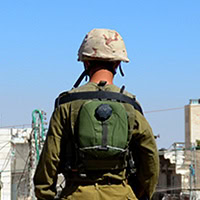Instructors: Gen. James Dubik and Stephen Rosen
Stipend: $1,000 (NYC area residents); $2,000 (Domestic US); $3,000 (International)
 War is an inescapable part of the human condition, with the course of history and the character of civilizations often shaped by the legacy of past battles and the possibility of future conflicts. Death and memory, heroism and tragedy, love of country and hatred of enemies—the human drama plays out, in sharp relief, on both ancient and modern battlefields.
War is an inescapable part of the human condition, with the course of history and the character of civilizations often shaped by the legacy of past battles and the possibility of future conflicts. Death and memory, heroism and tragedy, love of country and hatred of enemies—the human drama plays out, in sharp relief, on both ancient and modern battlefields.
Like any significant human activity, war raises profound moral questions for statesmen, soldiers, and citizens. When is war moral, and when is war unjust or even barbarous? Are there ethical and legal rules that should govern all warfare, and what happens when our enemies play by different rules? Do new technologies of war fundamentally alter the moral choices we face and the moral issues at stake? How do we deal with tough cases—including preemptive strikes, targeted killing, torture, drones, nuclear deterrence and nuclear proliferation, and the use of civilian shields?
Led by Harvard Professor Stephen Rosen, one of the world’s preeminent teachers of strategy, and Gen. James Dubik, one of America’s most experienced military leaders, this institute will think morally about war by looking at a series of key moments and great texts in military-political history: How do we evaluate the moral decisions of ancient peoples—such as the Athenians as portrayed in the Melian dialogue, or the Israelites as portrayed in the book of Joshua? Why continue fighting on the Western front in the First World War once the deadlock in the trenches emerged? Why firebomb the cities of Germany and Japan in World War II? Why not bomb death camps at Auschwitz? Is it right to use torture for prisoner interrogation in counter-terrorism campaigns? What about campaigns to starve civilians, as in the British blockade of Germany in World War I? And what about recent struggles—in Bosnia, in Iraq, and in Gaza? Or future dilemmas—such as the possibility of a nuclearized Middle East?
Our aim will be to analyze such cases in a way that takes seriously the political and strategic dilemmas, so that our moral judgments will be grounded in the real choices that leaders and citizens face, both in deciding when to fight and how to fight. In addition to lectures and seminar discussions, the course will utilize role playing simulations. Institute participants will be called upon to make ethical arguments for and against alternative courses of action from the standpoints of the statesmen, citizens, and soldiers affected by the decision.
Who Should Apply?
The Tikvah Advanced Institutes are aimed at men and women who wish to influence the intellectual, religious, and political life of the Jewish people and the Jewish state. Applicants may include those pursuing study or careers in US or Israeli public policy (including military and foreign policy), the rabbinate, academia, journalism, Jewish education, Jewish communal leadership, law, and business. Lay leaders are also encouraged to apply.
Time and Location
This institute will take place at the Tikvah Center in the heart of New York City (165 E. 56th Street). This is a full time commitment for Monday-Friday, with required sessions in the morning, afternoon, and some evenings.
Additional Details
Applications are now closed
Stipends are valued in U.S. dollars, but are dispersed to Israeli participants in shekels. We will convert from dollar to shekel based on the exchange rate on the date of payment.

 Stephen Peter Rosen is the Beton Michael Kaneb Professor of National Security and Military Affairs at Harvard University. He was the civilian assistant to the director of Net Assessment in the Office of the Secretary of Defense, the Director of Political-Military Affairs on the staff of the National Security Council, and a professor in the Strategic Department at the Naval…
Stephen Peter Rosen is the Beton Michael Kaneb Professor of National Security and Military Affairs at Harvard University. He was the civilian assistant to the director of Net Assessment in the Office of the Secretary of Defense, the Director of Political-Military Affairs on the staff of the National Security Council, and a professor in the Strategic Department at the Naval…